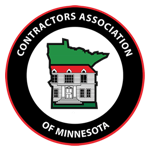CAM Best Practices
CAM members make a commitment to abide by a set of Best Business Practices.
A member must be in business for a minimum of 3 years under their current legal name and operate as an entity other than a sole proprietor.
- According to the SBA, one third of all businesses fail within the first two years. Many of these failures can be attributed to financial mismanagement.
- Three years with the same legal name give the contractor time to establish a track record with the Better Business Bureau in addition to other monitoring sources. This establishes a reputation as well as affording homeowners the ability to validate services provided.
- The sophistication of a 3 year old legal organization ensures it has grown through the initial audits and regulatory oversight that often brings surprises to the new entities that unsophisticated operators don’t plan for thus causes business interruption or failures.
The practice of “Partnering” or working as a business “Set” is prohibited.
- Property owners are given a false sense of security when out of area contractors use the good reputation of local contractors to attain work.
- Repair work often has a substandard outcome since there is little concern for maintaining the local contractor’s good reputation.
- The practice of business “Sets” is unfair to the property owner because it does not allow them to make an informed decision about the company completing the project.
Will not knowingly submit a fraudulent invoice to the property owner or the insurance company.
- Many property owners are unaware that when a contractor submits an invoice for work that was not completed, it may be illegal.
- When a contractor offers to waive a deductible, extend gifts or provides cash back to secure a project, it may be considered a form of insurance fraud.
Members place company signs on private properties only after receiving permission to do so.
- When companies place their signs on private property without permission, the goal may be to create a perception that their company is trusted among the neighborhood.
- This practice is a form of inappropriate and/or dishonest advertising.
- In many areas, this practice is illegal unless permitted by the property owner after the business has been contracted to perform services on the premises.
Do not attempt to interfere or begin negotiations with an existing contractual agreement between a property owner and another company.
- It is disingenuous when a contractor attempts to coerce or entice a property owner to break an existing contract.
- This behavior is illegal in some areas and may be considered to be Tortuous Interference.
Follow local and state licensing regulations, and perform all of the work to the state, count or jurisdictions code.
- Contractors engaged in the borrowing of licensure in order to avoid the process, and/or the requirements of securing a license for themselves is considered unscrupulous behavior.
- Contractors who intentionally avoid procuring a permit often do so to prevent a building inspection of the finished project.
- The processes of licensing contractors and procuring permits are put into place as a safeguard to protect property owners.
Members are required to carry the proper licensure and performance bonds as required by federal, state and local authorities.
- Adherence to all licensing and bonding requirements is at the core of what we stand for. A business that tries to “fly under the radar” of local and state authorities puts both the company and the property owner in jeopardy. Sooner or later it is figured out most of those companies don’t have the resources to correct the problems or pay the fines and subsequently go out of business.
- When performance bonds are required but are not procured , it is often a sign that the contractor is open to abusing the system and ultimately subjecting property owners to risk.
Members work to remove the stigma attached to storm restoration contractors by providing ongoing charitable programs, outreach and responsible work in our communities.
- The perception of storm restoration professionals has been affected in some areas due to the actions of disreputable or corrupt contractors.
- Storm restoration is about people helping people, and it is important to deliver that message to all property owners, more specifically those affected by catastrophic weather events.
The Mission of the CAM is to be a consumer friendly contractor organization. We promote the highest ethical standards in the exterior residential industry and adhere to a code of professional conduct, educate property owners about the insurance restoration process and give back to the community through outreach and charitable programs.
Latest News
Giving Back to Those That Have Sacrificed for Us : CAM Veteran Roof Project
CAM recently completed a roof for a DAV-MN Veteran Candidate FREE of charge to this Veteran Homeowner. We partnered [...]


